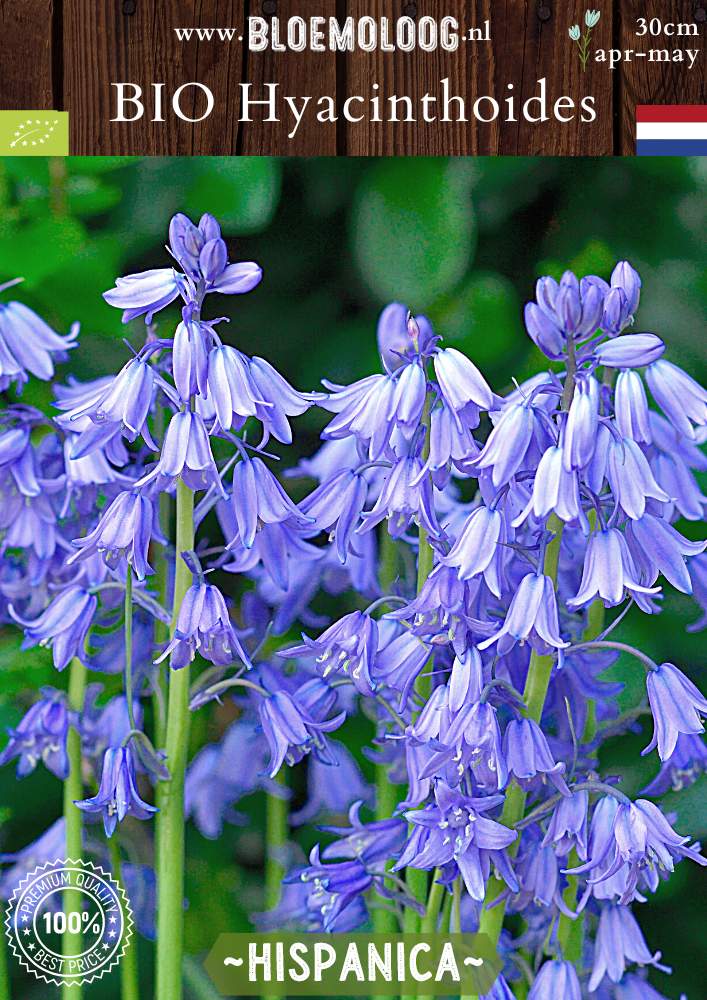Bloemoloog
Organic Hyacinthoides hispanica - wood hyacinths | 10 pcs.
Organic Hyacinthoides hispanica - wood hyacinths | 10 pcs.
Estimated Shipping Widget will be displayed here!
Couldn't load pickup availability
Organic wood hyacinths
The blue Hyacinthoides hispanica is also known in the Netherlands as 'wood hyacinth' or 'Spanish hyacinth'. It blooms in April and May in almost any type of soil. From the heart of the flower bulb grow 5 centimeter wide leaves and one or more flower stems that grow to approximately 30 centimeters in height. At the top of the flower stem, 2 centimeter wide, downward-hanging bells grow on the flower stem that contain a lot of nectar for pollinators such as bees and bumblebees.
Hyacinthoides hispanica naturalizes well and blooms in both the sun and the shade. Plant them in groups in lawns, borders or pots. This reliable plant returns year after year with beautiful flowers. It is a popular plant for its ornamental value and ability to cover large areas with a colorful display of flowers, similar to the wild bluebells found in the woods in spring.
How, where and when do I plant Hyacinthoides bulbs?
The flowerbulbs are planted in the ground from September to January. The planting depth is 2 to 3 times the height of the flowerbulb itself and the planting distance is 2 to 3 times the width of the flowerbulb itself. Hyacinthoides flowerbulbs are best planted in a location with partial shade to full shade, but will also bloom in the sun.
These plants thrive under trees, shrubs or in woodland environments. They can also be planted in borders, along paths or in rock gardens. Make sure the soil is well-drained and avoid areas that are too wet as this can cause bulb rot. In general, Hyacinthoides hispanica thrive in almost any soil type but perform best in moist, humus-rich soil.
Care of the wood hyacinths
Wood hyacinths generally do not need additional fertilizers. The flowerbulbs contain sufficient nutrients to grow and bloom. However, if the soil is poor, you can give a light application of a balanced fertilizer in the spring.
After flowering, remove spent flowers to prevent seed formation. This will save the plant energy and promote flowering for the next season. Allow the foliage to wilt and brown naturally. The foliage provides energy to the bulbs for the next flowering period. Do not cut the foliage until it has completely died.
In the right location, the flowerbulbs naturalize very well and come back faithfully every year!
Propagation
Hyacinthoides hispanica can propagate by seed or by forming new bulbs. The plants can become natural after a few years and form colonies. The breeding balls can be removed from the ground in early summer to separate the balls. Do this with a digging fork and dig well around the plant, so that the flowerbulbs are not damaged. Then plant them back in the ground from September to January.
Origin of the Spanish hyacinths
The Hyacinthoides hispanica comes from the asparagus family (Asparagaceae) and the origin of Hyacinthoides hispanica lies in the western Mediterranean, especially in Spain and Portugal. The plant grows naturally in wooded areas, meadows and along forest edges.
Particularities
- The Hyacinthoides hispanica is very similar to the 'wild hyacinth' (bluebells - Hyacinthoides 'Non-Scripta') which has a scent, but the hispanica does not have a scent.
- It can withstand salty winds well, making it suitable for places near the sea coast.
Buy Organic Hyacinthoides hispanica
Skal NL-NIO-01 certified: 109459
Packed per 10 flower bulbs or choose a stacking discount!
Stacking discount: E
Can be ordered from June '25!
EU shipping €8.95 - Free shipping from €100 purchase.
Characteristics
| Flowering time: | April - May |
| Planting time: | From September |
| Planting depth: | 10 cm deep |
| Planting distance: | 10 cm apart |
| Height: | 30 cm high |
| Flower diameter: | 10 cm wide |
| Location: | Sun - shade |
| Soil PH: | Clay, loam, sandy soil - Slightly acidic/neutral |
| Winter hardiness: | Very hardy |
| Propagation: | Good (naturalizes) |
| Origin: | Western Europe |
| Family: | Asparagaceae (asparagus family) |
| Colour: | Blue |
| Bee-friendly: | Yes |
| Fragrant: | No |
| Bulb size: | 6/7 |
Other Hyacinthoides species:
- Organic Hyacinthoides hispanica 'Alba'
- Organic Hyacinthoides hispanica 'Excelsior'
- Organic Hyacinthoides hispanica 'Pink'

NL-BIO-01
To share


